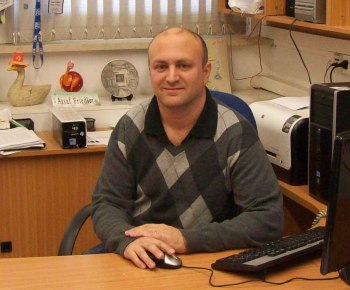| | 12 July, 2012
| | Scientists find new way to induce programmed cell death that could lead to potential cancer therapies | | A collaboration between the Hebrew University and the Weizmann Institute |
 | | Prof. Assaf Friedler of the Hebrew University of Jerusalem |
|
Researchers from the Hebrew University of Jerusalem and the Weizmann Institute of Science have developed a technique to cause apoptosis, or programmed cell death, that could lead to new approaches to treating cancer.
Apoptosis is an essential defense mechanism against the spread of abnormal cells such as cancer. It is a complex process that occurs through networks of proteins that interact with each other. Cancer cells usually avoid this process due to mutations in the genes that encode the relevant proteins. The result is that the cancer cells survive and take over while healthy cells die.
The research, by graduate student Chen Hener-Katz at the Hebrew University, involved collaboration between Prof. Assaf Friedler of the Hebrew University's Institute of Chemistry and Prof. Atan Gross of the Weizmann Institute's Department of Biological Regulation. It was published in the Journal of Biological Chemistry under the title ''Molecular Basis of the Interaction between Proapoptotic Truncated BID (tBID) Protein and Mitochondrial Carrier Homologue 2 (MTCH2) Protein.''
The study examined the interaction between two important proteins involved in cell death: mitochondrial carrier homologue 2 (MTCH2), which was discovered in the lab of Prof. Gross, and truncated BID (tBID), which are both involved in the apoptotic process. The researchers found the regions in the two proteins that are responsible for binding to each other, a critical step in initiating apoptosis. Following their discovery, the researchers developed short synthetic protein fragments, or peptides, that mimicked the areas on the proteins that bind to each other, and by doing so inhibited this binding. In lab experiments conducted on cell cultures, this resulted in the death of cancer cells of human origin.
''These protein segments could be the basis of future anti-cancer therapies in cases where the mechanism of natural cell death is not working properly,'' said Prof. Friedler. ''We have just begun to uncover the hidden potential in the interaction between these proteins. This is an important potential target for the development of anticancer drugs that will stimulate apoptosis by interfering with its regulation. ''
Prof. Friedler is the head of the school of chemistry at the Hebrew University. His major research interests are using peptides to study protein-protein interactions in health and disease, and developing peptides as drug leads that modulate these interactions, specifically in relation to HIV and cancer. Prof. Friedler won the prestigious starting grant from the ERC (European Research Council) as well as the outstanding young scientist prize by the Israeli Chemical Society. His research was supported by a grant from the Israel Ministry of Health and by a starting grant from the European Research Council.
|
|


